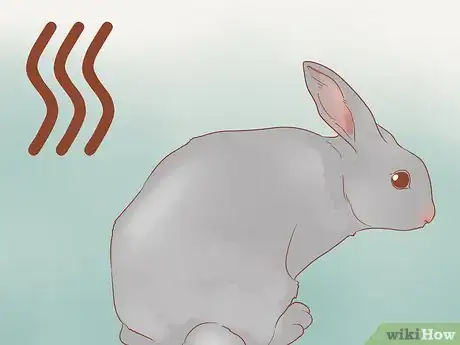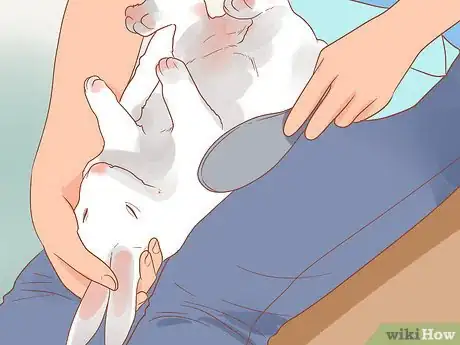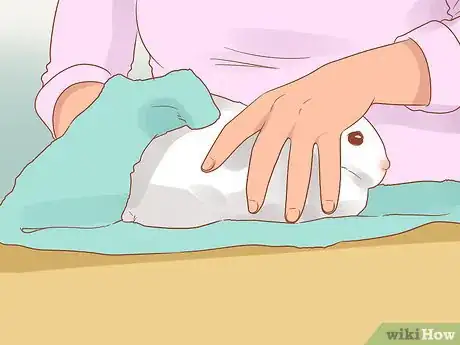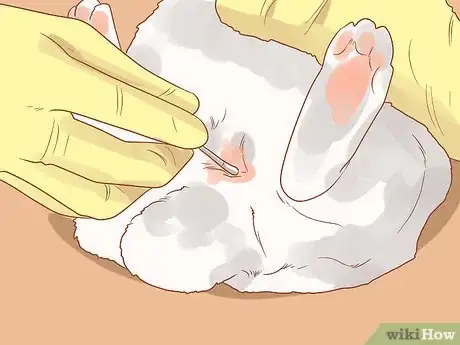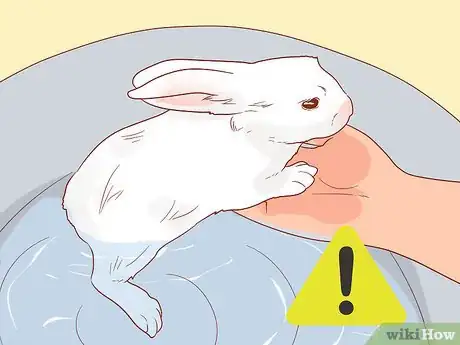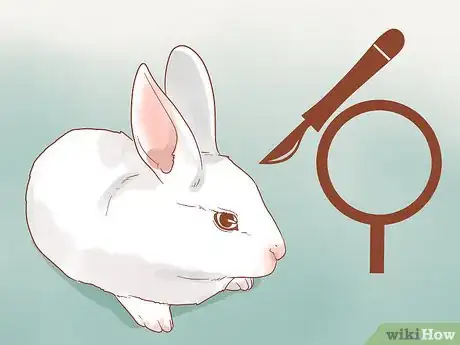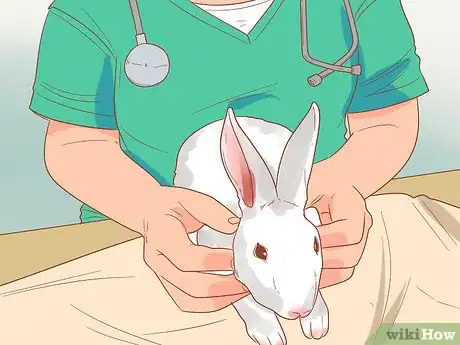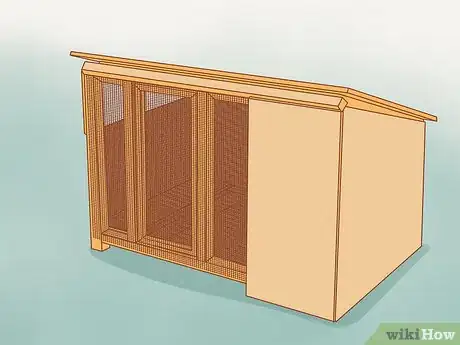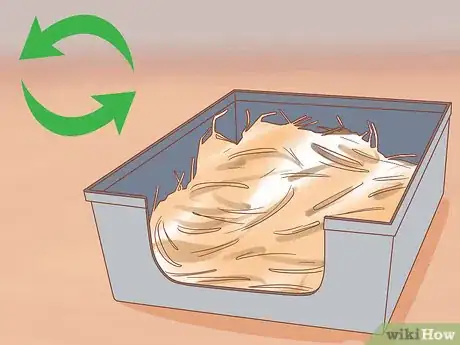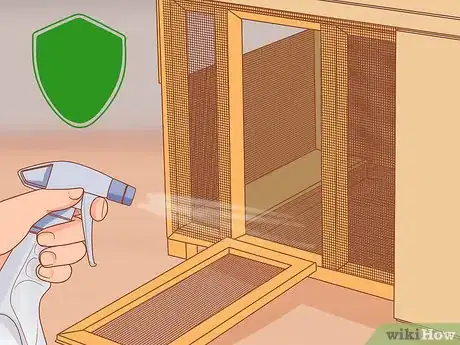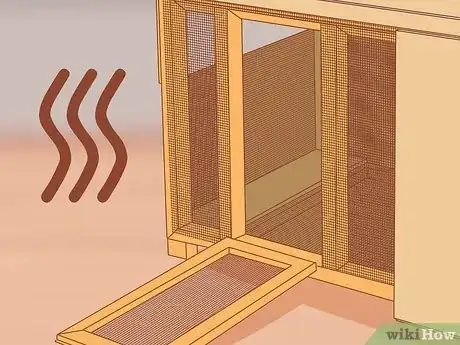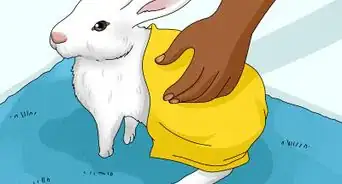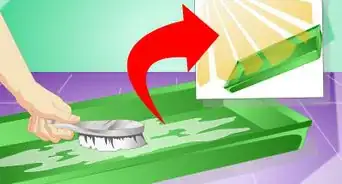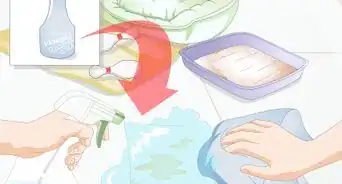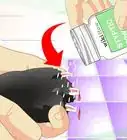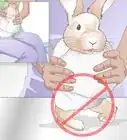This article was co-authored by Pippa Elliott, MRCVS. Dr. Elliott, BVMS, MRCVS is a veterinarian with over 30 years of experience in veterinary surgery and companion animal practice. She graduated from the University of Glasgow in 1987 with a degree in veterinary medicine and surgery. She has worked at the same animal clinic in her hometown for over 20 years.
This article has been viewed 162,523 times.
A rabbit will spend a lot of its time grooming itself to stay clean. If you have a pet rabbit in a properly cleaned cage, or "hutch", you shouldn't notice any strong smells coming from it at all. In fact, a bad smelling rabbit can be a sign that something is wrong with your pet. Check if the bad smell is coming from your rabbit or its hutch, and clean and care for it safely to stop your rabbit from smelling.
Steps
Caring for a Smelly Rabbit
-
1Smell your rabbit away from their enclosure. It can be hard to work out if the source of an odor is coming from your rabbit or its enclosure if the two are nearby. Carefully pick your rabbit up and carry it away to an area without any strong odors. Give your rabbit a good sniff to check whether it's the source of the bad smell.[1]
- Your rabbit’s fur should be mostly odorless, apart from a slight animal scent.
-
2Clean your rabbit with cornstarch and a comb if it’s dirty. While you should avoid bathing a rabbit as much as possible, it’s likely that it’ll still need occasional cleaning. Sprinkle some cornstarch over any dirty areas of your rabbit's fur to draw out any moisture, before using a fur comb to work out any mud or dirt stuck.[2]
- You should never use a powder that contains talc to clean your rabbit, as this can be hurtful to your pet's respiratory system and may even be carcinogenic.
- Even if your rabbit is completely covered in mud, this dry spot clean will be much safer than getting your rabbit wet. Apply cornstarch and comb out the dirt in small sections until your rabbit is completely clean.
Advertisement -
3Wipe down and trim the rabbit’s fur if waste is getting stuck. If your rabbit is getting pellets or urine stuck in its fur, use a grooming comb to brush away any waste before wiping the rabbit down with a very slightly damp cloth. Use a small pair of scissors to trim down your rabbit’s fur to prevent waste from getting stuck in it.[3]
- Take extreme care if you bathe your rabbit. It cannot hold its head up above the water, so it may drown easily if you do not watch it closely.
- If this happens often, it may be a sign that something else is wrong with your rabbit. Take it to a vet to make sure that it’s OK.
-
4Clean your rabbit’s scent glands. The scent glands around your rabbit’s anus may begin to build up with excretion after a while, which can be another source of a bad smell. Dip a cotton swab or ball into warm water and swab the area around their anus to remove all traces of excretion.[4]
- Your rabbit might get jumpy or uncomfortable while you clean this area, so it may be easier to have someone else hold your rabbit while you clean it as quickly as possible.
- If the fur near your rabbit’s anus becomes wet while you clean their glands, use a blow dryer on its lowest setting to dry the fur.
- If your rabbit's scent glands need to be cleaned, they'll be easily noticeable due to a brown build-up around the rabbit's anus. Check around your rabbit's hindquarters and anus for any brown color that indicates that the glands need cleaning.
- Your rabbit's scent glands should be cleaned roughly once a month.
-
5Avoid bathing your rabbit in water. Rabbits are very sensitive animals and do not easily adjust to being in water. Putting your rabbit into a water bath may make it very stressed, making your rabbit unhappy and possibly even increasing its chances of getting sick. Never bathe your rabbit in water, unless your vet specifically instructs you do to so.
- Rabbit fur will also take a long time to dry. Avoid getting your rabbit wet as much as possible.
-
6Get your rabbit desexed once it’s 6 months old to reduce its musky smell. As well as having numerous health benefits and decreasing the risk of some serious illnesses in your rabbit, getting your rabbit spayed or neutered can make them less territorial and aggressive. This may make your rabbit urinate in fewer places, and can remove the musky smell from a male rabbit. Get your rabbit desexed once it is 6 months old and sexually mature.[5]
- The surgery to have your rabbit desexed is very safe with an experienced vet and will lead to your rabbit having a longer life.
- Male rabbits will need to be neutered, whereas female rabbits will need to be spayed.
-
7Take your rabbit to the vet if they still smell. If nothing else is working and your rabbit still smells, it’s likely a sign that they are ill. Take your rabbit to a veterinarian experienced in caring for rabbits as soon as possible to get it diagnosed and treated.[6]
- A bad smelling rabbit could be a sign of an ear infection, an internal parasite, or even an open wound. All of these are very difficult to treat independently. Always take your rabbit to the vet immediately if you think something might be wrong.
Fixing a Smelly Rabbit Hutch
-
1Inspect the rabbit's hutch to determine if it's the source of the smell. Open up your rabbit’s hutch or enclosure to look around and smell it. Check for any areas that are particularly damp or any areas with waste in them that haven’t been cleaned recently.[7]
-
2Replace soiled hay each morning. If the odor is coming from the rabbit’s hutch, you might not be cleaning it often enough. Clean out any soiled or dirtied hay in the rabbit’s hutch each morning and replace it with new hay for your rabbit to sit in.[8]
- If you can’t clean the hutch each day, you should be doing it every other day at the absolute minimum.(But you really shouldn't keep them in a cage all day).
- If you don’t want to clean out the entire hutch, you could try litter train your rabbit so you only have to clean a small area or a litter tray.
- Your rabbit’s enclosure should smell like clean hay, which many find quite pleasant. If you smell anything stronger than this, it’s likely that you’ve found the source of the stink.
-
3Clean the whole hutch thoroughly once a week. Even if you’re cleaning out soiled hay each morning, some bad smelling substances can seep into the hutch itself. Clean the hutch thoroughly once each week by removing everything, scrubbing the hutch down with warm soapy water, misting lightly with white vinegar to disinfect it, and rinsing thoroughly with water.[9]
- You should also clean your rabbit’s food bowl and its water bottle or bowl when you clean out the hutch weekly.
-
4Leave the hutch to dry in the sun for 3 to 4 hours. If the hutch is still wet or damp when you put hay back into it, the hay may begin to rot and produce a bad smell. Let your rabbit run around freely or keep it in a small, temporary cage while the hutch dries completely.[10]
- You should be able to tell by touch if the hutch is still damp. Feel the inside for any dampness, leaving it to dry for longer if it is still wet.
- As long as you keep a few doors closed to prevent the rabbit from traveling too far, it should be perfectly content hopping around your home while its hutch dries.
Warnings
- You should never bathe your rabbit in water. It could give it hypothermia or put it into shock, both of which could kill it very quickly.⧼thumbs_response⧽
References
- ↑ https://rabbit.org/faq-grooming/
- ↑ http://www.bio.miami.edu/hare/buttbath.html
- ↑ https://rabbit.org/faq-grooming/
- ↑ https://rabbit.org/faq-grooming/
- ↑ https://rabbit.org/faq-spaying-and-neutering/
- ↑ https://rabbit.org/faq-grooming/
- ↑ https://rabbit.org/faq-housing/
- ↑ https://rabbit.org/care/tips99.html
- ↑ https://rabbit.org/care/tips99.html
About This Article
To stop a rabbit from smelling, try sprinkling cornstarch over its fur and working out any mud or dirt with a comb in order to clean it. You can also wipe down its fur using a cloth that's slightly damp. Just avoid bathing your rabbit in water since it might stress it out and make it sick. You can also prevent your rabbit from smelling by replacing soiled hay in its hutch each morning and cleaning the hutch thoroughly once a week. For more tips from our Veterinary co-author, like how to clean your rabbit's scent glands, keep reading!
